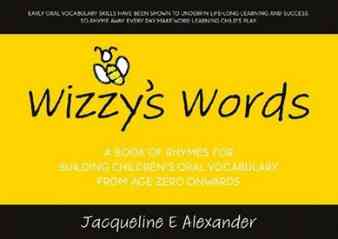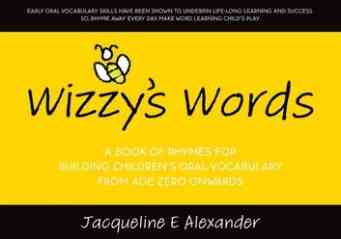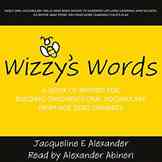What is Wizzy’s Words #languagedevelopment resource?
Introduction
The publishing of Wizzy’s Words, language development resource, is important as a number of children continue to reach the end of their reception year in school without meeting age-related oral vocabulary targets (see Bercow (2008), Tickell (2011), Hinds (2018). Damian Hinds Secretary of State for Education in 2018, met with a coalition of businesses, charities, technology and media groups, to address the ongoing gap between peers’ school entry language skills. Hinds noted that, ‘This, matters because when you’re behind from the start you rarely catch up.’
Following classroom observations and research my findings highlighted the need for a sharper and earlier focus on early language development, specifically oral vocabulary. In line with Hinds’ statement, an examination of the research, did indeed indicate that children rarely catch up if they are behind from the start. Importantly, my research also indicated that rhyme was the best starting point for developing a resource to support parents and early year’s educators to support children’s early language development. Wizzy’s Words was born in August 2021 and below is a quick overview of the Wizzy’s Words formats.
What is Wizzy’s Words?
Wizzy’s Words is a book of 70 modern nursery rhymes for today. Some of the rhymes follow traditional tunes, others follow a rhythmic pattern. The focus is on the creative delivery of the spoken word. The book contains the oral vocabulary that is known, from children’s language development studies, to underpin successful life-long learning, if developed before school entry.
Paperback eBook



Audiobook
Whichever format you are using, Wizzy’s Words has the spoken word as the focus. Wizzy’s Words, is about developing reading readiness in the first instance. This stage appears to missing for many children and is key to accessing later phonics, reading and writing. I have always loved singing and dancing with my early year’s children. However, to ensure that children are hearing the key oral vocabulary clearly, initially at least, it is important to say/recite, rather than sing the rhymes. That does not excuse you, me, us, from delivering the rhymes in creative and interactive ways. For example, using voices changes and adding puppets and props to the mix. Do it often - Make it fun!
The paperback - Is a hefty book running to 160 pages! The images have been carefully selected to match up to the rhymes and provide lots of opportunity for developing children’s language. For example, colours, size, health, science, PSHE all feature within the pages of Wizzy’s Words. Rather than being prescriptive it should be shared liberally with a child from birth. There is further advice on timing, in the answers to frequently asked questions, just click on the interview tab on the site. At least twice a day would be a good target but match to children’s level of interest too. Initially, the presentation of the rhymes will be parent led but this will then lead to shared and then individual saying/reciting of the rhymes. Wizzy’s Words is very much a book for sharing with children from birth. Whilst it will lend itself to later, phonics, reading and writing the early focus should be on sharing oral language.
The eBook - Children are exposed to a range of technology today. My research has shown that the sharing of a printed book will be most beneficial for early language learning due to the ease of sharing. However, there may be times, especially with the weight of the paperback, when the eBook may allow for access by presentation on a screen. If choosing this option then the focus should again, at least initially, be on saying/reciting the rhyme in a shared fashion not children viewing the screen.
The audiobook – Is a nice compliment to either the paperback book or the eBook. During my research I observed adults and children singing or reciting rhymes. My findings indicated that, to ensure that children could hear the focus oral words clearly that the audiobook should be narrated. Therefore, a sound engineer and professional actor spent many hours, putting together an audiobook that is read clearly but with sounds to help you to animate the rhymes with your children. Children developing in a language rich environment pick up language readily. If your child is absorbed in an activity, having the audiobook playing in the background can aid their language development.
Why is Wizzy’s Words important?
Wizzy’s Words is important because there is a relationship between poor early language development and life-long underachievement. For example, a study by the Communication Trust (2016), highlighted a study by Law et al, indicating that children with, ‘…a poor vocabulary at age five were one and a half times more likely to be poor readers or have mental health problems at age 32.’ This is supported by Department for Education data. Early Years Foundation Stage Profile data (2017), showed that 28% of four and five-year-old children had not developed age-appropriate language skills by the end of their reception year.
Tips and Reminders for using Wizzy’s Words
-use every day (see tips in Questions and Answers section (Interview tab)
-focus on sharing language
-focus on speaking clearly
-focus on being creative
-focus on developing a love of words
Together let’s puts words in their mouths and leave no child behind
Head to: www.wizzyswords.co.uk for frequently asked questions (click on interview tab) and free downloadable sample rhymes and to listen to the audiobook sampler
Head straight to: http://www.troubador.co.uk/bookshop/young-children/wizzys-words for orders and publisher information